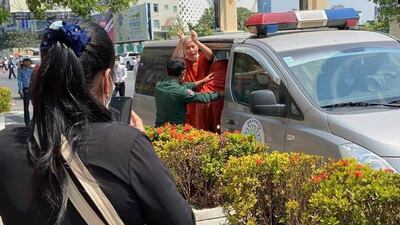Land dispute victims from nearly half of Cambodia’s two dozen provinces gathered in their respective communities Tuesday as part of a solidarity protest demanding that the government drop charges against six activists arrested over the past three years after working on their behalf.
In each location, between 10 and 20 people throughout 11 provinces displayed banners calling for the activists’ immediate release.
Seong Sokhom, who represents a community embroiled in a land dispute in Kampong Speu province, told RFA’s Khmer Service that in addition to calling for the release of the six activists, protesters were also urging the government to intervene with local authorities and provincial governments to resolve disputes, as well as to stop the military police and other security forces from intimidating and arresting villagers.
He said the campaign was launched to show solidarity and advocate peacefully on behalf of local communities seeking resolutions to their disputes in a country where corrupt land grabs are common and a source of social friction.
“I am appealing to the court to stop arresting and charging land activists—they are victims of land dispute and are being detained. Their families face hardship because they are losing their breadwinners,” he said.
“I am asking the government to resolve these issues equally and the best way to do so is by negotiating with the villagers and community to understand their needs.”
The six activist detainees are representatives from Tboung Khmum and Sihanoukville provinces. They were arrested separately in 2019, 2020, and 2021 after demanding the return of land they say were taken by companies and the well-connected.
In addition to the six in detention, nongovernmental organizations say there are at least 172 activists facing charges of “incitement to commit a felony” or “provoke social disorder” after demand the return of their land.
RFA was unable to reach government spokesman Phay Siphan or Ministry of Justice spokesman Chhin Malin for comment on the day’s events.
Coalition of Cambodian Farmers Community (CCFC) President Theng Savoeun told RFA that people are simply expressing their views and said he hopes the government will not interrupt their campaigns, but rather work to resolve their complaints.
“We are appealing to the ministries and especially the courts to provide justice to the victims and resolve their land disputes according to the law, to avoid violating their human rights,” he said.
A key source of social tension in Cambodia and other Southeast Asian countries is the widespread practice of land grabs in which authorities seize land from people for development projects or foreign invested enterprises without paying them fair compensation for lost crops, property, and livelihoods.
Villagers said the land campaign will progress “step by step” through smaller groups “until we succeed” in their goals. They also posted photos for the press Tuesday and planned to submit petitions to local authorities and relevant ministries.

Shaved head protest
Meanwhile, several detained activists from environmental watchdogs Mother Nature and Khmer Thavrak shaved their heads Tuesday in what family members said was meant to convey a call for justice and freedom.
Mother Nature activist Thun Ratha’s wife Bat Raksmey told RFA that her husband shaved his head to demand judicial independence and social justice. She said her husband’s spirit remain strong and that he has not been cowed by his arrest.
Bat Raksmey urged the court to release her husband, saying that detaining him will not benefit the government.
“The public has expressed support for my husband who loves the environment,” she said.
“Even though he remains detained, continues to advocate in prison. His demands are righteous and lawful.”
Khmer Thavrak activist So Metta’s sister Eng Vanndy told RFA that at first, she was surprised to learn that So Metta shaved her head, but later said she had come to appreciate what she called “a sacrifice for social justice.”
“What she has done was for the sake of freedom and natural resources,” she said.
Prison Department spokesperson Nuth Savna told RFA that prisoners have the right to shave their heads, but they should inform their prison directors to avoid allegations that they were forced to do so.
“They have the right to shave their heads to express themselves or for religious reasons, according to Article 29 of the Prison Law,” he said.
Soeung Sengkaruna, spokesperson for local rights group Adhoc, told RFA that the court should consider extending justice to the detained youths because they were working to protect the country’s environment and natural resources.
“Our constitution allows people who are unhappy to express themselves and to demand solutions from the state institutions,” he said.
The activists’ decision to shave their heads came after human rights defender and Khmer Thavarak campaigner Chhoeun Daravy shaved her head last week ahead of a court appearance.
Reported by RFA’s Khmer Service. Translated by Samean Yun. Written in English by Joshua Lipes.
